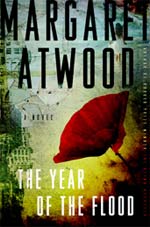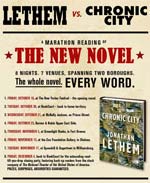
Week’s Highlights: Last Writes
The Literary Saloon links to D.J. Taylor’s lament in the New Statesman that “there is neither the money nor the space to sustain a career as a full-time book reviewer.” I won’t argue with him: whether it’s an unrelated part-time job, a full-time position as a staff writer or teacher, or authoring books, it seems to be essential for a book reviewer to have a reliable supplementary income to survive. Perhaps John Freeman will chime in somewhere, as he supposedly accomplished the feat for a while, although, given the rate of newspapers’ collapse and technological change, that was certainly an earlier and bygone era. (Freeman is now editor of Granta.)
By way of Chad Post, check out New Directions’ interview with Susan Bernofsky, who has translated Robert Walser, among others. Over the last decade, Walser has received the Stefan Zweig treatment—new translations brought into print by independent presses (New Directions, NYRB Classics, Bison Books), some great reviews and extended critical appraisals helping to revive his work and elucidate chains of influence. For more background on Walser and his strange life—the usual: years spent in an asylum, wrote in a nearly impenetrable German script that took 12 years to be deciphered, died face-down in the snow—read J.M. Coetzee’s “The Genius of Robert Walser.”
A man named Dan Reetz has created a book scanner—two really, one of which can fit into a suitcase—using $200 worth of spare parts.
Last month, literary journal TriQuarterly, based at Northwestern University, announced that it was going online only and would be cutting two of its editors. Observers say it seems like a gutting of the noted quarterly—essentially, the old magazine is being shut down, in favor of a new online publication with the same name, run by students—but the university claims that TriQuarterly will be “more efficient” in its new form. Ted Genoways, editor of VQR, commented for the article, saying that “the shuttering of TriQuarterly and termination of its editorial posts is troubling,” while also citing a similar lack of institutional support shown to New England Review and Southern Review. The changes have the backing of Reginald Gibbons, who edited TriQuarterly from 1981 to 1987. Also, Susan Harris, from the excellent Words Without Borders, is being hired to work on the mag’s new incarnation.

It can take you over. There’s no question. You can spend hours doing this stuff, following up on tags people send you, and interesting stuff – it can suck you in like a vortex
In the Wall Street Journal, Alexandra Alter interviewed VQR contributor Jonathan Lethem, whose new novel, Chronic City, is now available. Matthew Shaer reviewed the book in our new issue’s “Book Notes,” finding in Manhattan “an island rendered by Lethem as both familiar and vaguely exotic, a Chronic City alive with its own incandescent glow.” In the interview, Lethem alludes to a formative friendship with Paul Nelson, a “kind of legendary semi-reclusive rock critic.”

In the Times there’s an article that’s probably the closest we can get to a behind-the-scenes look at the judging process for the Nobel Prize in Literature. Among the notable bits: the five literature-committee members read the complete works of each of the five shortlisted writers, and each member writes essays on all shortlisted writers; these pieces are then distributed to the Academy.
Sign and Sight reprints an article in which recently anointed Nobelist Herta Müller discusses her experiences with the Romanian secret police and how it affected those close to her:
But when I saw her passport in our Berlin kitchen, and the additional visas for France and Greece, I confronted her directly: “You don’t get a passport like that for nothing, what did you do to get it?”
Listen
Francine Prose recently spoke to Tablet about her new book, Anne Frank: The Book, The Life, The Afterlife, which focuses on Anne Frank as a writer, rather than as a symbol of martyred Jewish youth.
Watch
Rooting around for video for this week’s round-up, I came across the following video of Orhan Pamuk, speaking at UC Santa Barbara. His new novel, The Museum of Innocence, will be published on October 20, and Pamuk plans to open, in Istanbul, an actual museum filled with objects from the novel.
